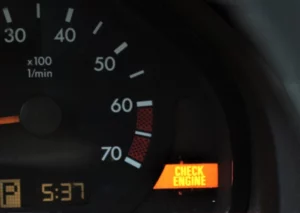Decoding the Check Engine Light: The Importance of Car Check Engine Light Service
 The check engine light, that small but significant warning symbol on your car’s dashboard, can trigger anxiety and uncertainty for many drivers. It serves as an early indicator of potential problems within your vehicle’s engine and other crucial systems. While it might be tempting to ignore it or hope it goes away on its own, addressing the check engine light promptly is essential for your car’s health, safety, and performance. In this blog post, we’ll explore the importance of car check engine light service, the role of the check engine light, common reasons it illuminates, and why it should never be ignored.
The check engine light, that small but significant warning symbol on your car’s dashboard, can trigger anxiety and uncertainty for many drivers. It serves as an early indicator of potential problems within your vehicle’s engine and other crucial systems. While it might be tempting to ignore it or hope it goes away on its own, addressing the check engine light promptly is essential for your car’s health, safety, and performance. In this blog post, we’ll explore the importance of car check engine light service, the role of the check engine light, common reasons it illuminates, and why it should never be ignored.
The check engine light often represented as an icon shaped like an engine is part of your car’s onboard diagnostics system (OBD). It is designed to monitor various sensors, systems, and components within your vehicle, such as:
- Engine Performance
The check engine light can detect issues related to fuel efficiency, emissions, and overall engine performance. - Emissions Control
It ensures your car’s emissions systems are functioning correctly, minimizing environmental impact. - Safety Systems
The light can also monitor vital safety systems like the airbag and stability control. - Transmission
Issues with the transmission, which directly affect your car’s drivability, can trigger the check engine light.
Common Reasons for the Check Engine Light
The check engine light can illuminate for a wide range of reasons, some of which may be minor while others are more serious. Common causes include:
- Faulty Oxygen Sensor
A malfunctioning oxygen sensor can lead to decreased fuel efficiency and increased emissions. - Loose Gas Cap
A loose or damaged gas cap can trigger the check engine light, affecting fuel economy and emissions. - Catalytic Converter Issues
Problems with the catalytic converter can lead to reduced performance and increased emissions. - Mass Airflow Sensor Trouble
A faulty mass airflow sensor can impact engine performance and fuel efficiency. - Ignition System Problems
Issues with spark plugs, ignition coils, or spark plug wires can lead to poor engine performance and fuel economy. - Emissions Control System Malfunction
Any malfunction in the emissions control system can trigger the check engine light and affect emissions. - Transmission Issues
Problems with the transmission, such as slipping or rough shifting, can cause the check engine light to illuminate.
Why You Shouldn’t Ignore the Check Engine Light
Ignoring the check engine light can have significant consequences for your vehicle and your wallet. Here’s why it should never be ignored:
- Safety
The light can signal issues with safety-critical systems like the airbags or stability control. - Cost Savings
Addressing minor issues early can prevent them from becoming major, costly repairs. - Fuel Efficiency
Resolving engine-related problems can improve fuel efficiency, saving you money at the pump. - Emissions Compliance
Ensuring your car meets emissions standards helps protect the environment and avoids potential fines. - Engine Health
Prompt attention to the check engine light helps maintain the health and longevity of your engine.
Professional Check Engine Light Service
When the check engine light comes on, it’s crucial to have your vehicle inspected and diagnosed by a professional. Here’s what to expect from a professional check engine light service:
- Diagnostic Scan
Using specialized equipment, a mechanic will perform a diagnostic scan to retrieve error codes stored in the vehicle’s computer system. - Detailed Analysis
The mechanic will analyze the error codes and conduct additional tests to pinpoint the root cause of the issue. - Recommendations
Based on the diagnosis, the mechanic will provide recommendations for necessary repairs or maintenance. - Quality Repairs
If repairs are needed, a professional mechanic will perform the work using quality parts and proper techniques. - Clearing Error Codes
After repairs, the mechanic will clear the error codes and reset the check engine light.
The check engine light is your vehicle’s way of communicating that something needs attention. Ignoring it can lead to safety hazards, increased repair costs, and reduced performance. Instead of hoping the light goes away, take it as an opportunity to address potential issues proactively. Consult with a professional mechanic who can diagnose the problem accurately and perform any necessary repairs. By doing so, you’ll not only ensure your car’s health and longevity but also enjoy peace of mind knowing that you’re driving a safe, efficient, and reliable vehicle. So, the next time your check engine light illuminates, remember that it’s not a cause for panic but a call to action for responsible car ownership.











